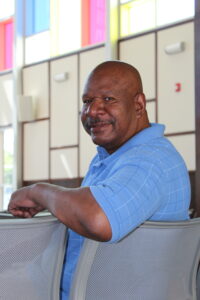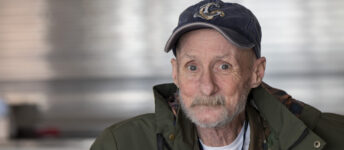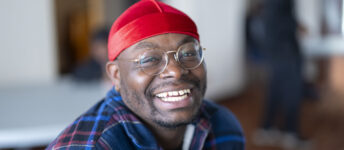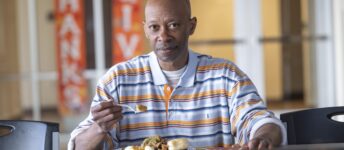Washington
Washington had great hopes for a better life. After seven years alone in an Ohio senior living facility, the 67-year-old felt a strong urge to move back to Virginia. “The Lord put it in my mind,” he said, “to start a new life for myself, to work in maintenance again.” He blindsided his family with the news that he had bought a bus ticket.
Not long after he arrived in Norfolk he shared even more shocking news. Washington was sick—very sick. He suffered hot flashes and chills, chest congestion, and a loss of appetite, then muscle weakness, fevers, and dizziness. The symptoms signaled something serious—and the deadly coronavirus was beginning to spread across the country, especially within vulnerable populations.
But as in years past, Washington was staying at The Union Mission. “They had always treated me like a guest, not a homeless person” he said. “They want to help you.”
Staff at the Men’s Shelter and in the Wellness Program helped Washington get to the emergency room, where he was immediately tested for coronavirus. Since his case was “presumptive positive,” he was housed in a separate building dedicated for possible COVID-19 cases. Six shelter workers who had been in direct contact with Washington also self-quarantined for everyone’s safety.
Though it took nearly a week for the hospital to complete his test results, “I wasn’t ever worried,” Washington said. “You don’t have COVID-19,” they told him, “just a nasty bad flu.” Because he still was ill and potentially contagious, Washington stayed in quarantine, using common flu remedies—menthol chest rub, cold medicines, cough drops, fruit juices, and lots of rest—to regain his health.
During his 21-day quarantine, “I was at peace,” Washington said. He admits he got a little homesick for his family in Ohio, and “sometimes I did just want to go out and see the sun,” he said, “but that type of a flu would have hitched itself to anyone whose body was weak or immune system was down…. It was for my safety and others’ that I stayed alone.”
 But “I really wasn’t alone,” Washington added. “In the Scripture the Lord says, ‘I am with you.’” He took advantage of his quarantine to pray, to praise God, and to read the Word. “There were so many verses that the Lord gave me,” he said. “When I got weak and the hard times came, I relied on the Bible.” Washington had been raised in his grandmother’s “big white Bible” faith. “All those old church mothers and COGIC pastors taught me how to live,” he said. “Feeling goes, but your faith holds.”
But “I really wasn’t alone,” Washington added. “In the Scripture the Lord says, ‘I am with you.’” He took advantage of his quarantine to pray, to praise God, and to read the Word. “There were so many verses that the Lord gave me,” he said. “When I got weak and the hard times came, I relied on the Bible.” Washington had been raised in his grandmother’s “big white Bible” faith. “All those old church mothers and COGIC pastors taught me how to live,” he said. “Feeling goes, but your faith holds.”
Washington recovered fully, but “I could have died,” he said. “There’s nowhere else in the world I would want to be through this than at The Union Mission, because of the love and care I received here.”
In gratitude, Washington began sweeping and picking up cigarette butts around the Men’s Shelter. “I picked up a little pride about keeping the place immaculate,” he said. “And it’s God’s house, so what better place to show some appreciation?” Soon the staff asked if he would help by wiping down door handles and sanitizing surfaces with disinfectant. “One hand washes the other one,” he said, using an especially apt metaphor. “That was another opportunity for me to serve!”
Washington believes he is at the Mission on a mission: “to serve people.” As he cleans, he often talks with his fellow shelter guests about Jesus. “I let them know about the risen Christ, that there is help.” But “you don’t just want to talk it. You want to show people that He is the light, and the only way they are going to see it is through your life.”
As an evangelist, Washington is looking not so much for a pulpit as for a place to serve. “I enjoy helping people,” he said. “That’s what I’m here for: to do His will. If you want to be great, be a servant!”
~ Cheryl Little for The Union Mission



